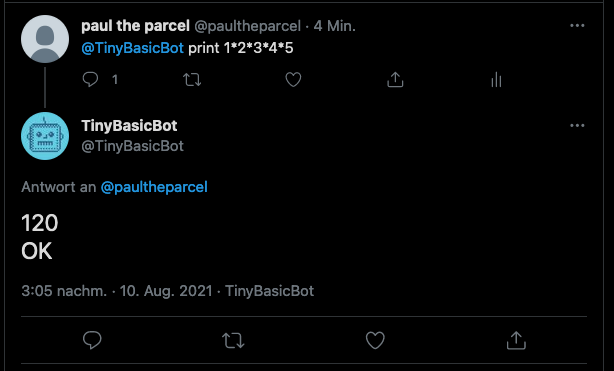Tiny Basic
This is a Tiny Basic interpreter written in Python (I'm still learning Python).
To find out more about Tiny Basic, check https://en.wikipedia.org/wiki/Tiny_BASIC
There was a challenge, posted by Jeff Atwood (coding-horror), to bring 100 ancient basic games back to life by porting them to mordern languages. The idea is to teach how you would do it nowadays. I looked at it and walked in the wrong direction and built a basic interpreter, just for fun. It's an implementation of Tiny Basic, a very limited Basic. It has no loops, no functions, very limited variables. It feels a bit like an assembler of sorts.
https://github.com/coding-horror/basic-computer-games
This version of Tiny Basic differs from its initial specification:
- it supports floats
- it supports TAB() to ease print formatting
- it has built in functions like ABS, INT, SQR and RND
The interpreter has no real purpose except amusement.
Running
You run it like so:
tb.py <filename>
or without parameter to run it in repl mode.
A simple program to compute sine:
10 PRINT "COMPUTING SIN(X)"
20 PRINT "ANGLE",
30 INPUT X
40 REM sin x = x − x^3/3! + x^5/5! − x^7/7!
50 LET X = X/180*3.141592
60 LET A = X*X*X
70 LET B = A*X*X
80 LET C = B*X*X
90 LET S = X - A/6 + B/120 - C/5040
100 PRINT "SIN=",S
110 ENDIn repl mode you can ommit the line numbers. If you do, the statement will be executed directly. If you enter a statement including a line number, it will be stored in memory.
./tb.py
Tiny Basic v0.1
LET A=5
OK
10 PRINT A
20 IF A = 0 THEN GOTO 100
30 LET A = A-1
40 GOTO 10
100 END
RUN
5
4
3
2
1
0
OK
Another option is to use stdin with a file in repl mode.
tb.py < input_file
If you are using this option, don't forget to include a RUN statement at the end. Otherwise it would just load the program into memory and then exit. You can/should include keyboard input as well.
This may be the contents of an input file:
10 PRINT "Factorial"
20 PRINT "Enter an integer: ",
30 LET F = 1
40 INPUT N
50 IF N = 0 THEN GOTO 90
60 LET F = F * N
70 LET N = N - 1
80 GOTO 50
90 PRINT F
RUN
5
Twitter bot
There is a twitter bot, based on this interpreter, that reads tweets, addressed to it, and then replies with the output of the statement or program. Take a look at http://twitter.com/TinyBasicBot
- The whole program has to fit into a single tweet (even 280 chars is enough for tiny programs). There is nothing, that survives the execution. The next tweet will find an empty memory.
- Output is limited. It will get truncated at 260 chars. You can not use '@' in the output.
- Execution is limited. Execution will stop after 1000 statements and return an error.
- Retweets will be ignored.
- Tweets mentioning the TinyBasicBot in the middle of the message, like
Hello @TinyBasicBot, will be ignored. - Tweets mentioning other users besides @TinyBasicBot will be ignored.
- Tweets currently take up to two minutes to process.
Statements
Special formatting for the PRINT statement is possible.
- Separating expressions by
,prints without any space - Separating expressions by
;prints with a single space - TAB(x) sets the cursor to position x
- a trailing
,omits the CR at the end and makes it possible to have the input?on the same line
The FOR loop can be used with or without the STEP parameter. If STEP is omitted, the step defaults to +1. The end of the FOR loop is controlled with the NEXT statement. It does not have the loop variable next to it. The NEXT statement is automatically associated with the last FOR statement. FOR loops can be nested.
10 FOR X = 0 TO 3 STEP 1
20 FOR Y = 0 TO 3 STEP 1
30 PRINT "x:",X,",y:",Y
40 NEXT
50 NEXT
60 ENDBugs
I'm sure there are lot. If you find any, please report them here https://github.com/tinkerlog/tiny_basic/issues
Grammar
line ::=
number statement | statement
statement ::=
'PRINT' expr-list |
'IF' expression relop expression 'THEN' statement |
'GOTO' expression |
'INPUT' var-list |
'LET' var '=' expression |
'FOR' var '=' expression 'TO' expression |
'FOR' var '=' expression 'TO' expression 'STEP' expression |
'NEXT' |
'GOSUB' expression |
'RETURN' |
'END' |
'LIST' |
'RUN' |
'CLEAR'
expr-list ::=
(tab | string | expression) (',' (tab | string | expression))*
tab ::=
'TAB(' expr ')'
var-list ::=
var (',' var)*
expression ::=
term (('+' | '-') term)*
term ::=
factor (('*' | '/' | 'MOD') factor)*
factor ::=
'+' factor |
'-' factor |
var |
number |
function |
'(' expression ')'
function ::=
'INT(' expression ')' |
'SQR(' expression ')' |
'RND(' expression ')' |
'ABS(' expression ')'
var ::=
'A' | 'B' | ... | 'Z'
number ::=
integer | float
integer ::=
digit_seq
float ::=
(digit_seq '.' digit_seq)
digit_seq ::=
digit digit*
digit ::=
'0' | '1' | ... | '9'
relop ::=
'<' | '=' | '>' | '<=' | '>=' | '<>'
string ::=
" ( |!|#|$ ... -|.|/|digit|: ... |A| ... |Z)* "
